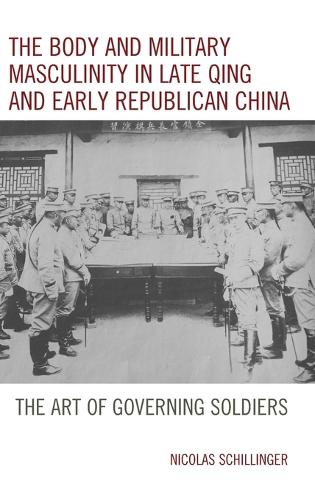
The Body and Military Masculinity in Late Qing and Early Republican China: The Art of Governing Soldiers
(Hardback)
Publishing Details
The Body and Military Masculinity in Late Qing and Early Republican China: The Art of Governing Soldiers
By (Author) Nicolas Schillinger
Bloomsbury Publishing PLC
Lexington Books
12th December 2016
United States
Classifications
Professional and Scholarly
Non Fiction
Military and defence strategy
Military history
Asian history
355.00954
Physical Properties
Hardback
428
Width 159mm, Height 239mm, Spine 30mm
853g
Description
In 18941895, after suffering defeat against Japan in a war primarily fought over the control of Korea, the Qing government initiated fundamental military reforms and established New Armies modeled after the German and Japanese military. Besides reorganizing the structure of the army and improving military training, the goal was to overcome the alleged physical weakness and lack of martial spirit attributed to Chinese soldiers in particular and to Chinese men in general. Intellectuals, government officials, and military circles criticized the pacifist and civil orientation of Chinese culture, which had resulted in a negative attitude towards its armed forces and martial values throughout society and a lack of interest in martial deeds, glory on the battlefield, and military achievements among men. The book examines the cultivation of new soldiers, officers, and civilians through new techniques intended to discipline their bodies and reconfigure their identities as military men and citizens. The book shows how the establishment of German-style New Armies in China between 1895 and 1916 led to the recreation of a militarized version of masculinity that stressed physical strength, discipline, professionalism, martial spirit, and Western military appearance and conduct. Although the military reforms did not prevent the downfall of the Qing Dynasty or provide stable military clout to subsequent regimes, they left a lasting legacy by reconfiguring Chinese military culture and recreating military masculinity and the image of men in China.
Reviews
Nicholas Schillingers The Body and Military Masculinity in Late Qing and Early Republican China is a welcome addition to the burgeoning field of military gender and cultural analysis that gives the reader a nuanced and lively account of how military organizations shape an understanding of the body in the pursuit of power. * Nan N: Men, Women and Gender in China *
It is conventional to view the Qing dynastys attempt to reform the Chinese military at the turn of the last century as a failure. Nicolas Schillinger demonstrates that this limited view misses a much more far-reaching legacy. New values such as martial masculinity, self-sacrifice for the nation, and patriotism were linked with new ways of dressing, moving, training, and caring for the body. The result was nothing less than a total transformation of men, gender, social hierarchy, and national identity which was absolutely central to Chinas modernization. Schillingers creative and thorough examination of a wide range of historical sources enables him to portray the history of the construction of a new image of manan image that still has relevance in todays China. -- Susan Brownell, University of MissouriSt. Louis
In imperial China, common sayings such as good men do not become soldiers reflect the common perception that military service was a lowly occupation. In this remarkable book, Nicholas Schillinger expertly recounts how reformist political leaders at the late Qing and early Republic transition advocated the incorporation of Western (mainly German and Japanese) methods to cultivate a new ideal of the citizen-soldier. Schillingers impressive and meticulous scholarship about the formation of modern ideas of the Chinese soldier is compelling reading. The book sheds much light not just on military topics, but on issues of masculinity, cultural contact and nation building. -- Kam Louie, University of Hong Kong and University of New South Wales
In The Body and Military Masculinity in Late Qing and Early Republican China, Nicolas Schillinger offers a definitive account of an important yet hitherto little explored topic: how did the disciplined male body associated with the modern nation come to China With an unusual richness in data and insight, the book examines the appropriation of European physical culture instigated by the late nineteenth and early twentieth-century military reforms in China. This study is a splendid contribution to the study of nationalism, modernity, and masculinity in the Chinese context. -- Geng Song, University of Hong Kong
Author Bio
Nicolas Schillinger is lecturer at the Institute of China Studies at the Free University of Berlin.
